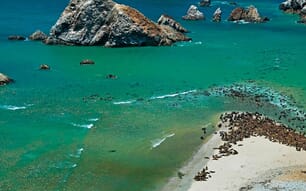
The farm, established in 2013, has been the focus of a decade-long study investigating its environmental impact. Findings suggest that mussels deposited from the farm's ropes are gradually transforming the seabed, once dominated by muddy sediment with limited biodiversity, into shellfish reefs. These emerging reefs are believed to support various commercial fish and crustacean species, contributing positively to the broader ecosystem.
A recently discovered map from 1871, uncovered by a local artist and now part of the Marine Biological Association's collection, has indicated that this restoration might be re-establishing habitats that previously existed in the area. The map, which spans from Torquay to Lyme Regis, labels a significant portion of the seabed as "rich shell beds," thought to be remnants of oyster or mussel reefs destroyed by bottom-towed fishing gear during the 20th century.
Following the establishment of the Lyme Bay Marine Protected Area (MPA), which prohibits such destructive fishing practices, the mussel farm’s operations appear to be aiding in the return of these shellfish reefs. The farm's sites are strategically located above these historical shell beds, facilitating this restoration process.
Dr Emma Sheehan, associate professor in marine conservation at the University of Plymouth and lead author of the study, commented on the findings: "When we first started to monitor the mussel farm in 2013, we hoped to find evidence of its potential to restore the health of the seabed. That is something we have shown consistently, with new species of marine flora and fauna regularly being seen within its ropes and on the seabed. However, to find out that such habitats were found in the region 150 years ago is really exciting. It shows that the farm is not only having a positive impact on the health of the ocean now, but also returning the seabed to some semblance of its former state.”
The study, published in Science of the Total Environment, also highlights the role of these restored reefs in supporting commercially valuable species. Using acoustic tags and underwater monitoring equipment, researchers observed that European lobsters remained in the farm’s vicinity for extended periods, utilising both the farm's anchors and the seabed, enriched with fallen mussels, for feeding and refuge. Conversely, brown crabs were found to be less inclined to remain within the farm’s boundaries, with all tagged individuals leaving the area within nine days.
These behaviours suggest that the mussel farm may be providing similar ecological functions to those of rocky reefs, particularly for species such as lobsters and crabs.
John Holmyard, managing director of Offshore Shellfish Ltd, which operates the Lyme Bay mussel farm, remarked: “These findings show that an area of flat, muddy and degraded seabed can be restored into a productive, biodiverse habitat. Through the location of a carefully designed offshore mussel farm, we are creating an effect comparable to that seen from the statutory protection of a rocky reef area. It is enabling lobsters and crabs to feed and grow within the protection of the farmed area before they move out and provide further benefits to surrounding fisheries.”
The research underscores the potential of well-managed aquaculture to contribute to marine conservation and habitat restoration, particularly in regions where traditional fishing practices have significantly altered the seabed.




